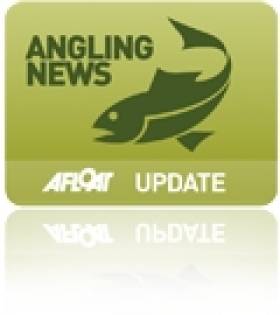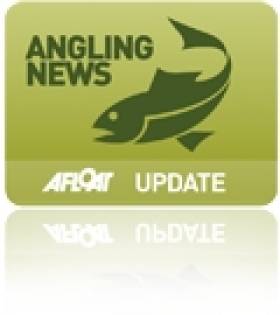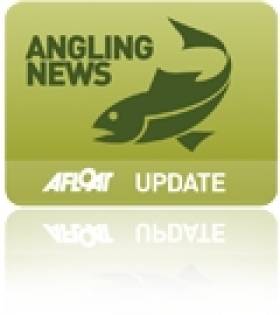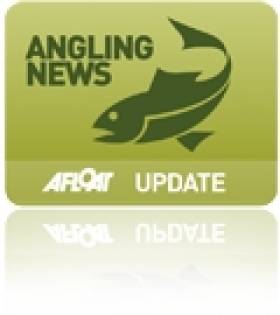Displaying items by tag: Celtic Sea Trout Project
'Broad Pattern Of Life Emerges' In Celtic Sea Trout Project Findings
#CelticSeaTrout - Minister Fergus O’Dowd joined anglers, environmentalists and fisheries scientists at the Westcourt Hotel in Drogheda on Tuesday evening (17 September) to hear some of the key findings of the Celtic Sea Trout Project, which was funded mainly by the EU under the INTERREG 4A Ireland-Wales Programme.
The enigmatic sea trout is a highly prized angling species, and to many anglers it is regarded as a fish which offers better sport than the salmon.
Sea trout support and sustain important and valuable fisheries throughout the study area of the Celtic Sea Trout Project (CSTP) launched two years ago, comprising the full extent of the Irish Sea and its contributing rivers and selected systems along the south coast of Ireland.
Ireland is blessed with sea trout fisheries, but other angling treasures, although well known locally, have emerged over the course of the project. Individually, these sea trout fisheries on both our major and lesser rivers have the potential to generate small but important social and economic benefits within local communities. Collectively, their importance and value at a regional and national level may be far greater than generally realised.
In addition to its angling value, the sea trout is a unique and potentially valuable indicator of environmental change and the quality of the aquatic environment, and this potential was fully investigated during the project where the marine ecology of sea trout was a key focus.
The CSTP is a unique project in which the scientists worked closely with anglers, fishery owners and inshore and offshore marine fishermen throughout the entire region bordering the Irish Sea and provided the required feedback to keep all informed about the project and the collective sea trout populations within the study area.
Congratulating all those who contributed to the CSTP, Minister O’Dowd said: “From the outset it was clear that the Celtic Sea Trout Project represented a major step forward to achieving our ultimate goal of maintaining healthy fish stocks that support biodiversity, sustainable fisheries and provide optimum benefits for the general community as a whole.”
From sea trout scales provided by anglers and others, a broad pattern of life histories emerged. This was of faster growth and higher survival (more multiple spawners) in southern Wales rivers; high survival, but somewhat slower growth in the northwest England rivers; and lower survival off the Irish coast, where finnock (fish returning in the same year that they smolted) dominated the runs in most rivers. The Currane system in Kerry was a notable exception, with a high proportion of long-lived adult sea trout.
The comprehensive genetic study found nine principal regional groups within the data set and clear differences in the areas that these groups occupied during their marine feeding migration, although there were also examples of substantial exchange rates between them. This was demonstrated by some migrants which were recorded up to 300km from their river of origin.
Welsh and Irish Ministers Check Out Celtic Sea Trout Project
#ANGLING - Sea trout were top of the agenda at a recent meeting between Welsh Deputy Fisheries Minister Alun Davies and Minister of State Fergus O’Dowd at Leinster House recently.
Both ministers were briefed about progress with the INTERREG IVa Ireland-Wales-funded Celtic Sea Trout Project, which finishes in 2013.
Sea trout are present in most coastal rivers discharging into the Irish Sea, and their status in freshwater and in the marine environment is central to the project.
By providing detailed information about the status of sea trout stocks, their genetics and their varied life histories, the project aims to enhance the fisheries for the benefit of all stakeholders.
Other important aims of the project are strengthening the contribution of sea trout to rural economies, to general quality of life and well-being and to national biodiversity - while sea trout life history variation may also contribute to understanding the effects of climate change.
For sustainable management the Celtic Sea Trout Project team is working on developing a number of management tools which will assist fisheries managers to assess fishery performance and better manage this valuable species. The requirement to manage sea trout sustainably across the Irish Sea was strongly emphasised.
Both ministers heard that engagement with anglers across the project has been important to provide sea trout scale samples, and that the project has served to increase awareness of the value of what Inland Fisheries Ireland (IFI) described as "this excellent angling species".
Minister Davies was also briefed about the role and broad responsibilities of IFI.
#ANGLING - Two Irish anglers were the top sea trout samplers for the Celtic Sea Trout Project in 2011.
Martin McKenny from the River Dee and Brian McShane from the Castletown River, plus several other Irish winners, will be presented with their valuable tackle voucher prizes by Minister Fergus O’Dowd at a Fisheries Awareness Week event on 20 May at the Ardboyne Hotel in Navan, Co. Meath.
Martin, who regularly fishes the Dee, provided the most sets of sea trout scales from fish he caught on rod and line in his favourite river.
In the runners-up spot was Brian McShane who also provided a large numbers of sets of scales from the beautiful Castletown River. Virtually all fish were returned alive after the small sample of scales had been taken.
Congratulating all the Irish winners, Minister O'Dowd said: "I commend these anglers and their efforts in supporting the Celtic Sea Trout Project. The success of the project is assured with such cooperation from the winning anglers and all participating anglers who have contributed so much to the project."
Since 2010 scales have been collected by anglers from sea trout from priority rivers which flow into the Irish and Celtic Seas in Ireland, Wales, Scotland, England and the Isle of Man.
The scales, which are like life history diaries, will provide scientists working on the Celtic Sea Trout Project with essential information on sea trout populations in the rivers sampled including their age, growth and how many times they have spawned.
The project, which is part-funded by the European Regional Development Fund under the Ireland Wales Territorial Co-operation Programme 2007-2013 (INTERREG 4A), aims to increase our understanding of sea trout, in order to manage them better and increase their contribution to local economies and the quality of life. Full details about the project can be found at www.celticseatrout.com.
Full list of winners in Ireland
Overall winner (covering anglers from Ireland, Wales Scotland, England/Isle of Man): Martin McKenny from the River Dee
Regional winners (1 of 4 Regions): Brian McShane of the Castletown
The following anglers names were drawn at random and have each won £100 (or equivalent value in €) in tackle vouchers (4 winners from 10 draws are from Ireland):
Andy Kelly of the Slaney
Martin McCarthy of the Argideen
Jimmy Condra of the Boyne
John Harmon of the Boyne
Minister Lenihan launches €2million Celtic Sea Trout Project
The Celtic Sea Trout Project has its official launch at Coillte's Avondale House, Rathdrum, Co. Wicklow this evening. This groundbreaking €2million project, mainly funded by the Wales – Ireland Interreg programme, will see Inland Fisheries Ireland work closely with anglers, fishery owners, netsmen, inshore and offshore marine fishermen and in cooperation across the 6 political and administrative regions with separate jurisdictions over the Irish Sea with the ultimate goal of ensuring sustainable sea trout fisheries.
Sea trout support and sustain important and valuable fisheries throughout the study area and are a unique and potentially valuable indicator of environmental change and the quality of the aquatic environment. The overall project aims are to further the proactive conservation of trout biodiversity and to enable better management of sea trout stocks in their freshwater and marine environments so as to strengthen their social, economic and cultural benefits to local and regional communities. It also aims to promote cooperative working, the effective dissemination of knowledge and a wider general awareness of management needs and options for the conservation and sustainable management of sea trout stocks.
Launching the project Minister Conor Lenihan commented that "the Celtic Sea Trout project represents a major step forward to achieving our ultimate goal of maintaining healthy fish stocks that support biodiversity, sustainable fisheries and provide optimum benefits for the general community as a whole".
For further information on the Celtic Sea Trout Project please log on to www.celticseatrout.com



























































